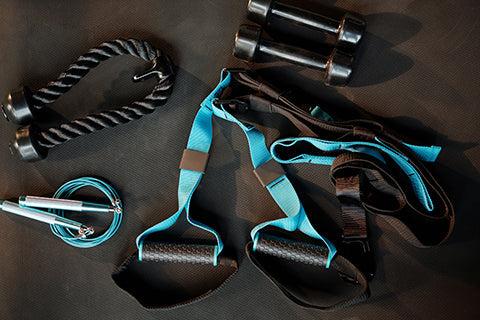
Resistance Bands Vs Dumbbells – Which Is Better?

Y
ou’ve seen the debate. One trainer swears by dumbbells for “real gains.” The other trainer says that resistance bands are the future of functional fitness. So which tool is the one to get you results—and which one just looks better on camera?
Let’s cut through the hype.
Whether you are training at home, recovering from an injury, or pursuing hypertrophy, what is right for you goes beyond convenience; it is about tension, control, progression, and purpose.
This blog will delve into the science, strategy, and real-world applications of each tool, along with a short quiz to help you discover your best fit.
Also Read: 7 Resistance Band Exercises
The Science of Resistance: What Builds Strength Best?
Both bands and dumbbells provide resistance, but in different ways.
|
Feature |
Resistance Bands |
Dumbbells |
|
Type of Resistance |
Variable (increases with stretch) |
Constant (gravity) |
|
Muscle Activation |
More eccentric and stabilizer muscles |
More compound lifts and load-bearing |
|
Joint Impact |
Low-impact, joint-friendly |
Potentially high-impact if form breaks |
|
Progressive Overload |
Via thicker bands or more stretch |
Via heavier weights |
Also Read: Stretches That Help Fix Bad Posture
Why it matters:

• Bands incur an ascending tension, meaning the tension increases as the band stretches. This introduces stress to your muscles differently compared to the constant tension from free weights, especially in the eccentric (lowering) portion of motion.
• Dumbbells are strictly gravity-based resistance and maintain the same tension from the beginning to the end of the motion. They are perfect for anybody performing traditional strength protocols or anyone looking to produce power.
Which One Fits Your Training Goals?
Let’s align the tool to the goal:
Goal: Increase Muscle Mass
Winner: Dumbbells.
Dumbbells allow for the classic hypertrophy paradigms (8-12 reps, 3-4 sets). They allow for precision progressive overload, making them a solid tool for big-time muscle building.
Goal: Increase Mobility & Rehab
Winner: Resistance Bands
Offer controlled tension. Ideal for lower joint stress movements, rehab type movements, and activation type drills. There’s a good reason your physical therapist gives you bands - they’re safe, versatile, and effective.
Goal: Train Anywhere, Anytime
Winner: Resistance Bands
Lightweight, portable, adaptable - convenience wherever you are in the world (hotel/airport, small spaces, squeezing in immediately or between meetings). No gym? No problem.
Goal: Aesthetics & Toning
Winner: Both
Bands help isolate and activate the smaller muscle groups. Dumbbells help to build density and shape. Ultimately, combine them to maximise your results (think repetitions of banded glute bridges after a set of dumbbell squats).
Also Read: Dumbbell Leg Workouts For Men & Women
Why Not Use Both?
This is a hybrid programming that combines those benefits:
Warm-up:
• Band pull-aparts (shoulder activation)
• Lateral band walks (glute activation)
Strength Block:
• Dumbbell goblet squats
• Dumbbell overhead presses
• Dumbbell bent-over rows
Accessory Work:
• Band-resisted glute bridges
• Band tricep extensions
• Band face pulls
Cooldown:
• Band-assisted hamstring and shoulder stretches
This is the complete package! Load, control, activation, and recovery.
Also Read: Aerobic Vs Anaerobic Exercise – Know The Difference
Interactive Quiz:
Find Your Fit: Have a go at the 3 questions below to find out what tool works best for your current training stage:
1. Do you train at home or at a gym?
• Home- Resistance bands will become your new best friend! Resistance bands are space‐saving, easy to travel with, and versatile for full body workouts.
• Gym- Dumbbells are the best way to gain more load options and exercise variability. You will get progressive overload and compound lift options.
2. Are you recovering from an injury or going fully beast mode?
• Recovering- Resistance Bands allow joint-friendly resistance exercise with controlled movements. Resistance bands are perfect for rehab, mobility and activation.
• Beast mode- Dumbbells allow heavier loads to be pushed and build strength! Just ensure your form is spot on.
3. Are you more interested in slow control or explosive power?
• Slow control: Bands are incredibly effective at time-under-tension for eccentric control -- great for training sculpting and stabilization.
• Explosive power: Dumbbells are much better at more dynamic lifts like snatches, cleans, and presses.
Your Result:

• If you answered "bands," you are in mobility, rehab, or sculpting. Focus on control, activation, and versatility.
• If you are all "dumbbells," you are obviously in a strength or hypertrophy phase. Load, compound lifts, and progressive overload first.
• If you are split down the middle, congratulations! You can train with a hybrid approach maximizing both odd lifting tools.
Final Thoughts: Don’t Choose—Strategize

The question isn’t really, “Which is better? It’s “Which is better for you—right now?” Both resistance bands and dumbbells have some great advantages in the resistance training game. The smartest athletes and trainers use both tools—strategically, deliberately, and with intention. So whether you use resistance bands or dumbbells, just ensure your training is reflective of your goals, your body, and your lifestyle.
Pro tip: Consider cycling your tools every 4-6 weeks. Use resistance bands for activation and recovery phases, and use dumbbells for strength blocks. Avoiding redundancy will keep your body guessing and progressing.
Strength isn’t just about the tool—it’s about how you use the tool. Resistance bands and dumbbells each have their strengths. The smartest training plans don’t hold loyalty to one—they build strategies…
So, whether you’re stretching into your mobility or pressing for your power, use the resistance that will continue to move you forward. Now go lift with intention…
Also Read: 5 Best Chest Exercises
 Follow our Instagram page for the latest updates: badalkhudko
Follow our Instagram page for the latest updates: badalkhudko




Leave a comment